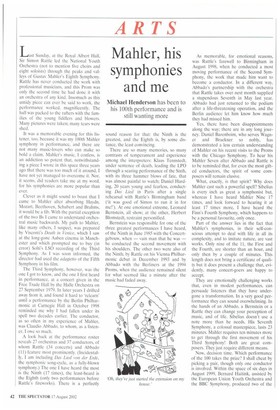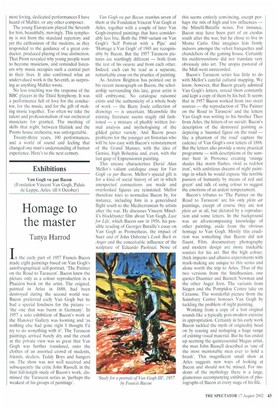Mahler, his symphonies and me
Michael Henderson has been to his 100th performance and is still wanting more
Last Sunday, at the Royal Albert Hall, Sir Simon Rattle led the National Youth Orchestra (not to mention five choirs and eight soloists) through the peaks and valleys of Gustav Mahler's Eighth Symphony. Rattle has never conducted the work with professional musicians, and this Prom was only the second time he had done it with an orchestra of any kind. Insomuch as this untidy piece can ever be said to work, the performance worked, magnificently. The hall was packed to the rafters with the families of the young fiddlers and blowers. Many pictures were taken; many tears were shed.
It was a memorable evening for this listener. too, because it was my 100th Mahler symphony in performance, and there are not many music-lovers who can make so bold a claim. Mahler's music, I confess, is an addiction so potent that, notwithstanding a piece I wrote in this space three years ago that there was too much of it around, 1 have not yet managed to overcome it. Nor, it seems, did readers take me at my word, for his symphonies are more popular than ever.
Clever as it might sound to boast that I came to Mahler after absorbing Haydn, Mozart, Beethoven, Schubert and Brahms, it would be a fib. With the partial exception of the two Bs I came to understand orchestral music backwards. My path to Mahler, like many others, I suspect, was prepared by Visconti's Death in Venice, which I saw at the long-gone Aaben cinema in Manchester and which prompted me to buy (in error) Solti's LSO recording of the Third Symphony. As I was soon informed, the director had used the adagietto of the Fifth Symphony in his film.
The Third Symphony, however, was the one I got to know, and the one I first heard in performance, at a concert given in the Free Trade Hall by the Halle Orchestra on 27 September 1979. In later years I drifted away from it, and found it hard to 'relearn' until a performance by the Berlin Philharmonic at Carnegie Hall in October 1998 reminded me why I had fallen under its spell two decades earlier. The conductor, as so often in my experience of Mahler, was Claudio Abbado. to whom, as a listener. I owe so much.
A look back at the performance roster reveals 27 orchestras and 37 conductors, of whom Rattle (34 concerts) and Abbado (11) feature most prominently. (Incidentally, I am including Das Lied von der Erde, the symphonic song-cycle, as a fully-blown symphony.) The one I have heard the most is the Ninth (17 times), the least-heard is the Eighth (only two performances before Rattle's fireworks). There is a perfectly sound reason for that: the Ninth is the greatest, and the Eighth is, by some distance, the least convincing.
There are so many memories, so many contrasts of temperament and experience among the interpreters: Klaus Tennstedt, under sentence of death, leading the LPO through a searing performance of the Sixth, with its three hammer blows of fate, that was almost painful to watch; Daniel Harding, 20 years young and fearless, conducting Das Lied in Paris after a single rehearsal with Rattle's Birmingham band ('it was good of Simon to run it in for me!'). At one emotional extreme, Leonard Bernstein, all show; at the other, Herbert Blomstedt, restraint personified.
Bernstein was responsible for one of the three greatest performances I have heard, of the Ninth in June 1985 with the Concertgebouw, when — vain man that he was — he conducted the second movement with his shoulders. The other two were also of the Ninth, by Rattle on his Vienna Philharmonic debut in December 1993 and by Abbado with the Berliners at the 1994 Proms, when the audience remained silent for what seemed like a minute after the music had faded away. As memorable, for emotional reasons, was Rattle's farewell to Birmingham in August 1998, when he conducted a most moving performance of the Second Symphony, the work that made him want to become a conductor. In a different way. Abbado's partnership with the orchestra that Rattle takes over next month supplied a stupendous Seventh in May last year. Abbado had just returned to the podium after a life-threatening operation, and the Berlin audience let him know how much they had missed him.
Yes, there have been disappointments along the way; there are in any long journey. Daniel Barenboim, who serves Wagner and Bruckner so nobly, has demonstrated a less certain understanding of Mahler on his recent visits to the Proms with the Chicago Symphony. To hear his Mahler Seven after Abbado and Rattle is to be reminded that, for even the most gifted conductors, the spirit of some composers will remain elusive.
What, exactly, is that spirit? Why does Mahler cast such a powerful spell? Sibelius is every inch as great a symphonist but, whereas I have heard Mahler Nine 17 times, and look forward to hearing it at least 17 times more, I have heard the Finn's Fourth Symphony, which happens to be a personal favourite, only once.
Part of the answer lies in the fact that Mahler's symphonies, in their self-conscious attempt to deal with life in all its complexity, and to imitate nature, are vast works. Only nine of the 11, the First and the Fourth, are shorter than an hour, and only then by a couple of minutes. This length does not bring a certificate of quality but it does present a challenge that, evidently, many concert-goers are happy to accept.
They are emotionally challenging works that, even in modest performances, can persuade listeners that they have undergone a transformation. In a very good performance they can sound overwhelming. In the hands of an Abbado, a Bernstein or a Rattle they can change your perception of music, and of life. Sibelius doesn't use a note more than he needs. His Seventh Symphony, a colossal masterpiece, lasts 23 minutes. Mahler requires ten minutes more to get through the first movement of his Third Symphony! Both are great composers. They just require different means.
Now, decision time. Which performance of the 100 takes the prize? I shall cheat by picking a pair, though only one conductor is involved. Within the space of six days in August 1999, Bernard Haitink, assisted by the European Union Youth Orchestra and the BBC Symphony, produced two of the most loving, dedicated performances I have heard of Mahler, or any other composer.
The young Europeans played the Seventh for him, beautifully, movingly. This symphony is not from the standard repertory and yet the enthusiasm of the students, as they responded to the guidance of a great conductor, produced playing of true distinction. That Prom revealed why young people want to become musicians, and reminded listeners why music occupies such a central part in their lives. It also confirmed what an undervalued work is the Seventh, as surprising as anything Mahler wrote.
No less touching was the response of the BBC players in the Third Symphony. It was a performance full of love for the conductor, for the music, and for the gift of making music together. Too often we take the talent and professionalism of our orchestral musicians for granted. The meshing of skills that night. between Haitink and the Proms house orchestra, was unforgettable.
Twenty-three years, 100 performances, and a world of sound and feeling that changed one man's understanding of human experience. Here's to the next century.































































 Previous page
Previous page